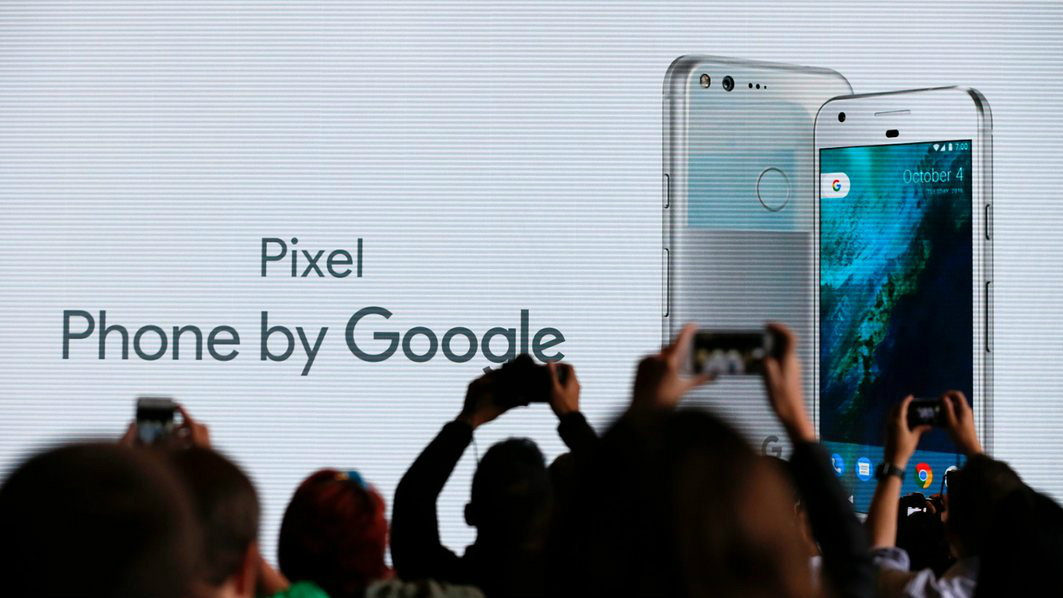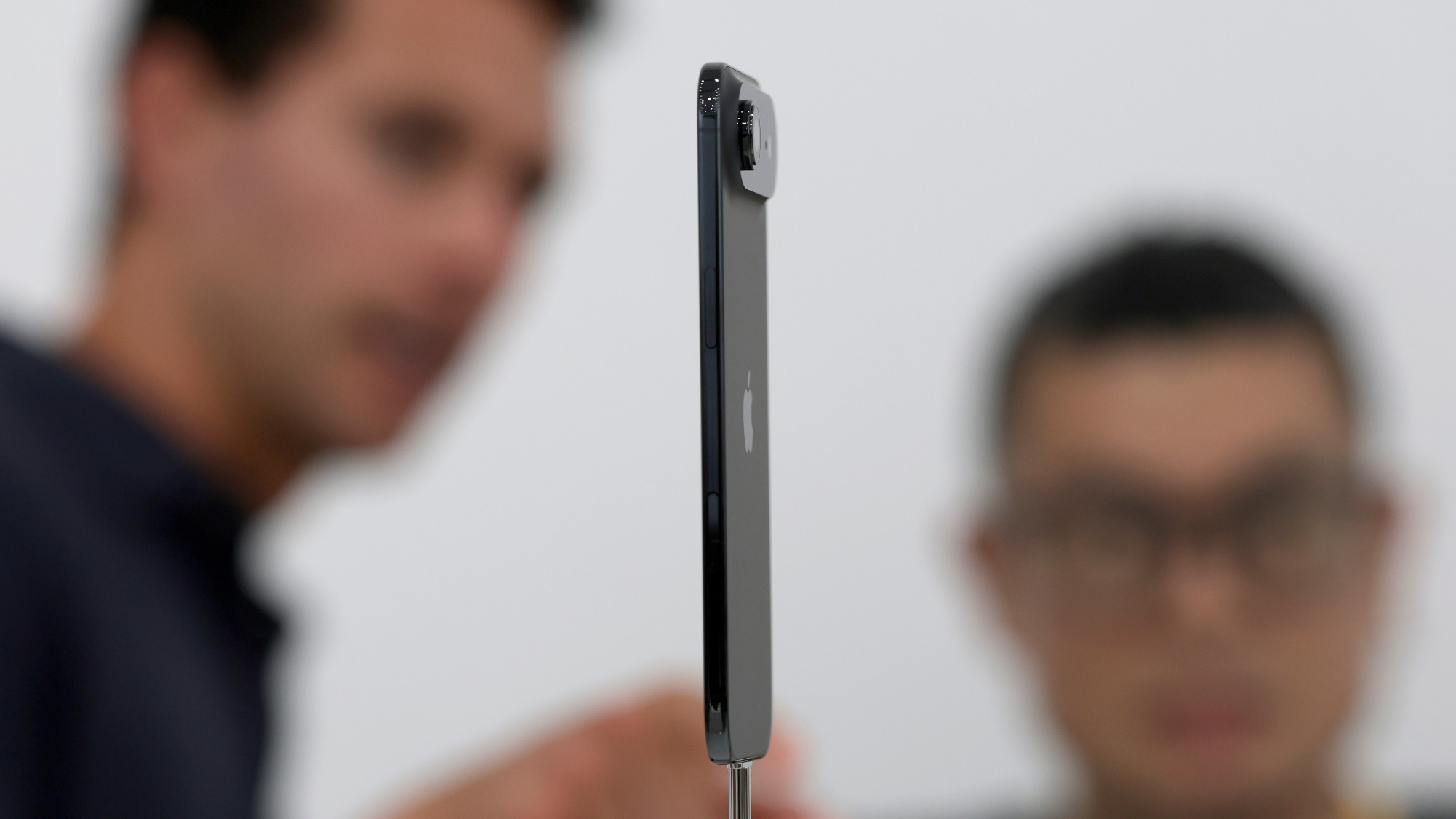iPhone 7 vs Google Pixel: Which one should you buy?
Internet giant's new smartphone will rival Apple's flagship device – but how do they compare?

A free daily email with the biggest news stories of the day – and the best features from TheWeek.com
You are now subscribed
Your newsletter sign-up was successful
Google is going fully toe-to-toe with Apple in the smartphone market, releasing a new device designed to be a perfect Android rival to the iPhone 7.
It's called the Pixel and while it's actually made by HTC, it's still the closest thing you'll get to a Google iPhone.
The internet giant is pretty confident about its new handset, even matching the latest iPhone on price. But is it worth a look in if you're a serial buyer of Apple's gadgets?
The Week
Escape your echo chamber. Get the facts behind the news, plus analysis from multiple perspectives.

Sign up for The Week's Free Newsletters
From our morning news briefing to a weekly Good News Newsletter, get the best of The Week delivered directly to your inbox.
From our morning news briefing to a weekly Good News Newsletter, get the best of The Week delivered directly to your inbox.
Here's how the two phones compare on paper and what the critics think.
Design
The iPhone 7 has barely evolved in the last two years. The aluminium casing with curved edges hasn't changed since the iPhone 6 was introduced in 2014, although the antenna bands have been neatly tucked into the top and bottom edges and the camera housing rearranged to accommodate new hardware.
Look on the bottom of the handset and you'll see the iPhone 7's most controversial feature: the new non-moving home button's haptic feedback hardware leaves no space for a headphone jack, so owners have to use the Lightning port for both charging and connecting wired headphones.
A free daily email with the biggest news stories of the day – and the best features from TheWeek.com
At first glance, Google's phone looks similar to Apple's offering. It's another aluminium casing with rounded edges, but the back is half glass and half metal and is also home to a fingerprint scanner. The Pixel in the UK comes in either silver or black, while Apple's range comes in silver, gold, rose gold and matt or glossy black.
The Pixel is slightly taller, wider and heavier than the iPhone, while its 0.3ins (8.6mm) thickness makes it a little fatter than the iPhone 7's 0.28ins (7.1mm) frame.
In terms of appearance, the two phones look pretty similar, but some features really set them apart.
The iPhone's lack of a headphone jack could be a defining issue when it comes to choosing between the two. Nevertheless, the Apple handset does have one trick up its sleeve – waterproofing.
The iPhone 7 comes with an IP67 water and dustproof rating, so it can be submerged in water up to three feet deep and is completely protected from dust ingress. It's something Google has completely left out of its new phone. The Pixel has an IP53 rating – it wouldn't survive a quick dunk and even prolonged rain could have an effect.
Display
The two phones come in two sizes - standard and larger, phablet-style devices.
Google's standard phone packs in a larger display than its Apple peer. It's a 5ins (127mm) panel to the iPhone's 4.7ins (119mm) screen. Both the Pixel XL and iPhone 7 have 5.5ins (139mm) screens.
Apple's phones still use LCD screens, with the iPhone 7 sporting the latest version of Apple's Retina HD display technology, with a wider colour gamut for brighter tones. Resolution comes in at 1,334 x 750 pixels, for a pixel density of 326ppi, on the standard model.
The Pixel uses AMOLED technology and has a full HD display, with a 1,080 x 1920 resolution and a slightly higher pixel density of 424ppi. Trusted Reviews says you're are unlikely to notice a huge benefit in the slightly higher spec screen, but it'll come in handy when using the phone for one of its killer features – virtual reality.
The difference between displays on the larger phones, however, is night and day. Google's Pixel XL has an AMOLED screen with a Quad HD resolution, while the iPhone 7 Plus is still LCD and can only match the resolution of the 5ins Pixel.
You're unlikely to be disappointed by the display on the iPhone 7 Plus, says Trusted Reviews, but the Pixel XL definitely has the edge on paper.
Hardware
Both phones use quad-core processors for the kind of power and performance you'd expect from flagship devices.
The iPhone 7 boasts Apple's latest A10 fusion chipset under the hood, mated to 2GB RAM in the standard handset and 3GB RAM in the iPhone 7 Plus.
The Pixel, meanwhile, has a Qualcomm chipset. It's the new Snapdragon 821 chip, is married to 4GB RAM in both phones and is the required piece of hardware to work Google's VR platform, Daydream.
Apple's devices tend to lag on paper in terms of specs, but they always link up brilliantly with iOS and generally perform as well as phones with twice as much RAM. The iPhone 7 has recorded some of the highest benchmarking scores for a smartphone and BGR thinks it's unlikely the Pixel will dethrone it when it comes to speed and performance.
The Pixel should have a greater battery life, though. It AMOLED screens are far more energy efficient than their LCD counterparts and the standard Pixel's 2,770mAh capacity battery is bigger than the iPhone 7's 1,960mAh cell. It supports quick-charging via USB-C too, so you can top up the battery to last seven hours in a mere 15 minutes.
Neither phone offers support for MicroSD cards, but both come with storage sizes of 32GB and 128GB – the iPhone 7 has a 256GB option at the very top end.
Cameras
The regular Pixel's camera sports a higher megapixel count – 12.3mp to 12mp – to the iPhone 7, but the Apple device has a wider aperture that should allow more light in for better shots at night, especially with its quad-LED true tone flash.
Nevertheless, Google's camera should be great and the company claims it'll be the best on the market when the phone launches. According to DxOMark, that is not just marketing hype – the Pixel's camera scored 89 out of 100 when tested by the analysts, higher not only than the iPhone 7, which came in at 86, but all the others the site has trialled.
Like the iPhone 7, the Pixel has optical image stabilisation as well as the ability to record video in 4K. What really makes its camera special, however, is the addition of HDR+ along with a smart-burst feature that automatically takes a selection of rapid photos and selects the best one.
The iPhone 7 Plus stands on its own in terms of hardware, sporting a dual-camera system for genuine optical zoom capabilities.
Software
For many, software will be the main factor when it comes down to deciding between which model to buy. Google producing its own phone means the Pixel vs iPhone battle will be the purest match yet between Android and iOS.
The Pixel will come with Android Marshmallow 7.1 and will be the first phone with Siri rival Google Assistant built into it. As a result, it doesn't quite run stock Android and gets its own unique user interface.
The iPhone 7 runs iOS 10, the latest version of Apple's mobile operating system. Highlights include an overhaul of menus, a new lock screen with widgets and rich notifications, 3D Touch commands and big changes to Apple's Messages app.
Apple doesn't seem too interested in developing its iPhone software to accommodate virtual reality, while the Pixel is the first phone to be compatible with Daydream.
Prices
Google has gone toe-to-toe with Apple in this. The Pixel starts from £599 – just like the iPhone 7. Even the phablet versions match each other in cost, both starting from £719.
Verdicts
Pocket Lint's verdict is pretty simple – it's a draw, as the two phones are completely deadlocked when it comes to price and also come with pretty similar specs.
The Pixel outguns the iPhone when it comes to display size, battery life and RAM, it says. Plus it's the first Daydream VR-ready phone. However, the iPhone 7 fights back with a better design, waterproofing and a more functional display thanks to 3D touch.
Ultimately, it will come down to which operating system you prefer, says the site.
On the other hand, Stuff declares a winner, but only by a "slight nod". The site prefers the iPhone 7, simply because it doesn't think the Pixel is the best Android phone you can buy.
Google's offering tops Apple in terms of its display and cameras and the VR support is hand, says Stuff, but these can't touch the overall experience of using the iPhone.
If you'd like an Android smartphone, the site recommends the Samsung Galaxy S7, HTC 10 or the bargain OnePlus 3 instead.
-
 How the FCC’s ‘equal time’ rule works
How the FCC’s ‘equal time’ rule worksIn the Spotlight The law is at the heart of the Colbert-CBS conflict
-
 What is the endgame in the DHS shutdown?
What is the endgame in the DHS shutdown?Today’s Big Question Democrats want to rein in ICE’s immigration crackdown
-
 ‘Poor time management isn’t just an inconvenience’
‘Poor time management isn’t just an inconvenience’Instant Opinion Opinion, comment and editorials of the day
-
 Will AI kill the smartphone?
Will AI kill the smartphone?In The Spotlight OpenAI and Meta want to unseat the ‘Lennon and McCartney’ of the gadget era
-
 Has Google burst the Nvidia bubble?
Has Google burst the Nvidia bubble?Today’s Big Question The world’s most valuable company faces a challenge from Google, as companies eye up ‘more specialised’ and ‘less power-hungry’ alternatives
-
 Is Apple’s Tim Cook about to retire?
Is Apple’s Tim Cook about to retire?Today's Big Question A departure could come early next year
-
 How the online world relies on AWS cloud servers
How the online world relies on AWS cloud serversThe Explainer Chaos caused by Monday’s online outage shows that ‘when AWS sneezes, half the internet catches the flu’
-
 iPhone Air: Thinness comes at a high price
iPhone Air: Thinness comes at a high priceFeature Apple’s new iPhone is its thinnest yet but is it worth the higher price and weaker battery life?
-
 Is the UK government getting too close to Big Tech?
Is the UK government getting too close to Big Tech?Today’s Big Question US-UK tech pact, supported by Nvidia and OpenAI, is part of Silicon Valley drive to ‘lock in’ American AI with US allies
-
 Google: A monopoly past its prime?
Google: A monopoly past its prime?Feature Google’s antitrust case ends with a slap on the wrist as courts struggle to keep up with the tech industry’s rapid changes
-
 South Korea's divide over allowing Google Maps
South Korea's divide over allowing Google MapsTalking Points The country is one of few modern democracies where the app doesn't work